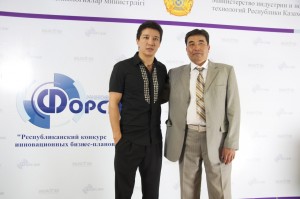ASTANA – An industrial project to produce artificial gravel in Uralsk, supported by Astana’s Technology Commercialisation Centre (TCC) as well as several government agencies, is starting to gain interest from Europe and may soon see its products shipped around the world.
The West Kazakhstan Building Materials Corporation project, run by Project Manager Sarsembek Montayev, makes gravel that can be used for insulation, building foundations, concrete and roads out of the abundant siliceous rock found in the region, Montayev said in an interview at Eurasia National University, where six commercially successful technological projects were being presented during the enlarged meeting of the Ministry of Education and Science on Feb. 12.
This particular material is lighter by about half as well as less thermally conductive than traditional gravel, Montayev said, making it easier to carry to road and other construction sites, as well as ideal for providing insulation.
In 2014, the company won a roughly $245,000 industrial prototype grant from the TCC, which aims to support commercially viable science and technology startups with grants, counselling and other assistance. “The grant that we received allowed us to buy equipment and launch testing at the plant, and finally it allowed us to make the first sales in Uralsk,” Montayev said.
Since then, the product has been earning attention in Kazakhstan and beyond. “We have just recently presented out technology in Riga, Latvia, where [our partners] are testing our product in order to certify it for European standards,” Montayev said. Once this certification process is completed, Montayev believes the gravel from Uralsk has the potential to reach a wide market, including African and European countries that don’t have this particular type of rock.
But while Montayev would like to expand, the first step must be to establish the project in western Kazakhstan, he said, particularly in Atyrau, a region in the midst of active road-building and infrastructure development, but one that also lacks this type of natural materials. A press release announcing the launch of the new gravel product said that market research had found that the pilot run of the plant, with a capacity to make 190,000 cubic metres of gravel, would fill a significant percent of the needs of West Kazakhstan’s current road-building operations it said.
As the project expands, it will create jobs in Uralsk and beyond, Montayev said. “We will create jobs in Uralsk. We also will create a branch that will specifically focus on heat insulators, and that part of our production will also create additional jobs.”
Many people have supported his project along the way, Montayev was quick to point out. “I would like to add that our project is supported by all echelons of government, including the regional and city administrations, techno parks and other social government institutions,” he said. This may be because his gravel is crucial to Kazakhstan’s transit and general infrastructure development, Montayev noted. “There are issues with timely delivery of gravel to [some areas under intense construction], and no one is interested in delays of gravel as it would slow down road construction, et cetera,” the project manager said.



